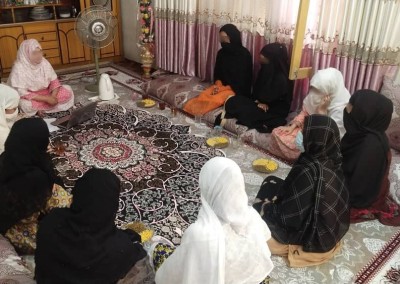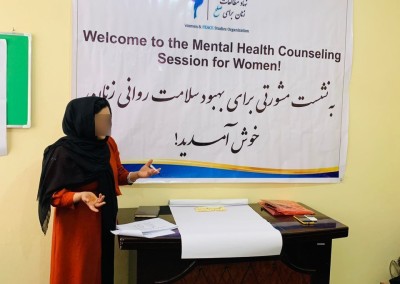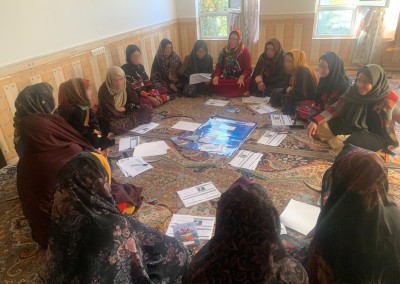Despite staggering challenges and limited space to operate, the Women, Peace, Studies Organization (WPSO) continues to provide support for women in every province of Afghanistan. Malalai Habibi, Program Officer at the International Civil Society Action Network (ICAN), sat down with WPSO’s Founder and Program Manager to learn how WPSO has adapted its work since the Taliban’s takeover and to understand the impact of their ICAN-funded projects on Afghan women and girls.
Since the Taliban seized control of Afghanistan in August 2021, the country’s formerly active civil society has been almost entirely suffocated. Many local organizations, particularly those that are women-led, have shut down because of lack of funding, insecurity, and the Taliban’s restrictive policies.
As described by WPSO’s Founder, these developments have had a huge impact on WPSO’s work and have “changed all [their] strategies and approaches of the last 12 years. Before we were very much outside in the community, but with the Taliban regime we have been pushed inside homes.” Despite major challenges, including a decree issued at the end of 2022 barring Afghan women from working for national or international NGOs in the country, WPSO has continued to operate.
WPSO is proof that impactful work can be done – and is best done – by local Afghan organizations who have the knowledge, access, and trust in communities. However, their work is impossible without dedicated external assistance and funding that allows them to meet security needs and support their staff. ICAN provides WPSO with a holistic package of support, including solidarity, strategic accompaniment, and long-term and flexible funding.
“Women’s lives are confined to the four walls of their homes”
Afghanistan is in the midst of a devastating humanitarian crisis and economic collapse. According to OCHA, in 2023 over 28 million people – two thirds of the country’s population – will need urgent humanitarian assistance to survive. The population is facing growing poverty and food insecurity, with Afghan women and girls disproportionally affected.
A year and a half after the Taliban took over Afghanistan, we are seeing the almost-total exclusion of half the population from public life. The Taliban has issued a series of decrees which violate women and girls’ rights to education, employment, freedom of movement and public interactions. Without mobility, women and girls also lack access to basic services, such as healthcare.
These restrictions go beyond denying education and employment but remove any space for women to engage. As described by an Afghan activist: “women’s lives are confined to the four walls of their homes, and inside the homes the level of violence is so high.” Domestic and gender-based violence is pervasive and survivors have little protection or systems of support to turn to. WPSO is witnessing a mental health crisis amongst Afghan women and girls, with high suicide rates, severe psychological distress, depression, and despair.
Self-Help Groups, Skills Learning and Psychosocial Support
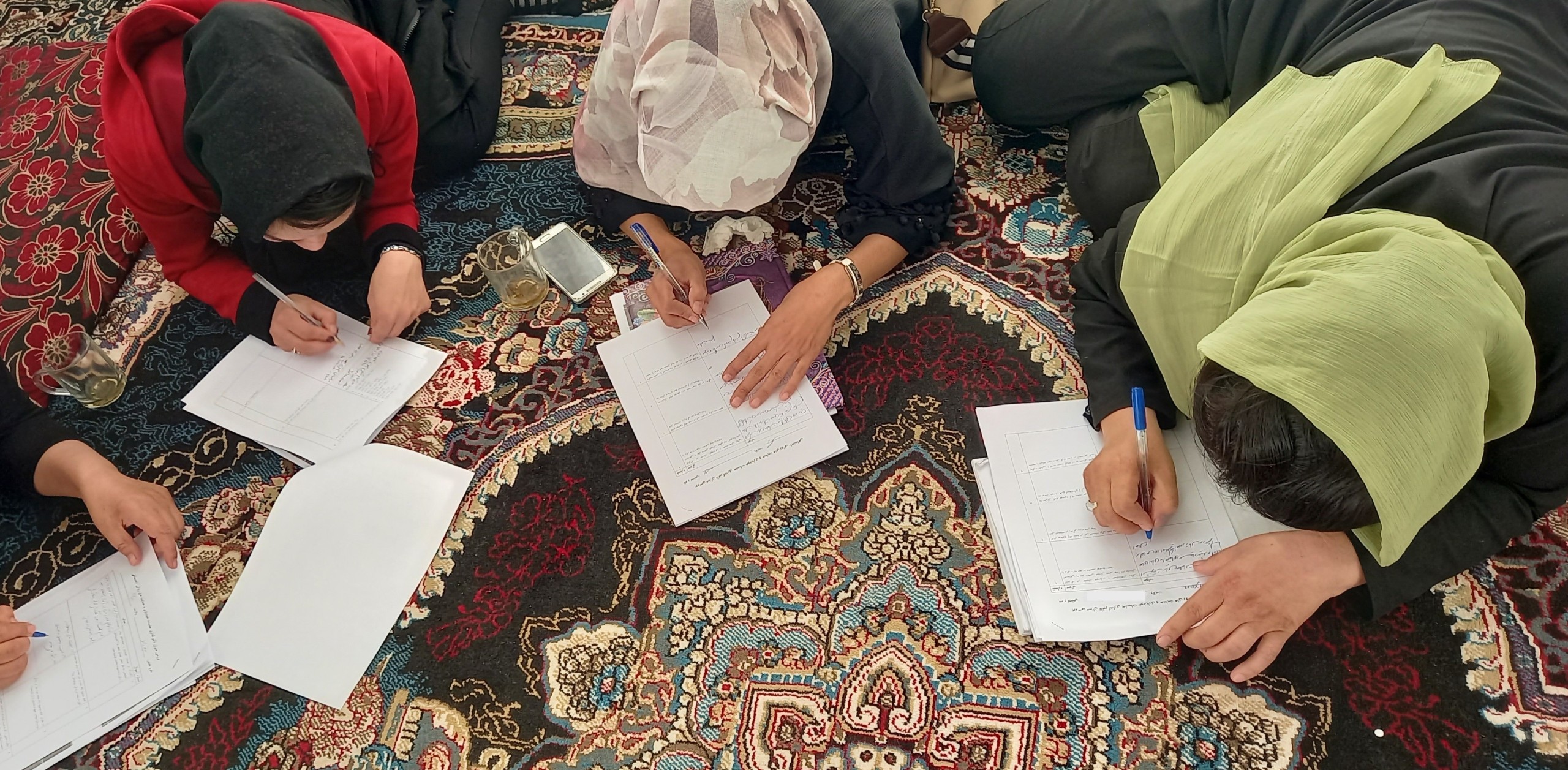
WPSO Self-Help Group
After August 2021, WPSO was forced to reevaluate the organization’s strategy and work. They did not want to lose the vast network they had built across Afghanistan over the previous 12 years but were no longer able to engage communities by bringing people together, without the threat of violence and intimidation. As WPSO’s Founder explained:
“Being an organization that is not a humanitarian or food distribution organization but instead focuses on empowering, creating spaces, convening and bringing activists together and raising their voices makes things very hard for us.”
In December 2022, when the Taliban announced that NGOs could no longer employ female staff, WPSO was again forced to change course.
In consultation with ICAN, WPSO explored new approaches to sustain its operations and, with support from ICAN’s grant-making mechanism – the Innovative Peace Fund (IPF) – initiated women-only self-help groups (SHGs). The model originated from rural parts of India, where women live in restricted environments and face staggering levels of poverty.
SHGs provide a safe space for groups of women to come together inside homes with a facilitator. Together they identify primary concerns and basic needs in their community and explore local solutions, for example pooling money and resources for basic food and economic needs.
WPSO utilized its existing network of focal points – local women peacebuilders – who had been working with the organization as community mobilizers across Afghanistan. Over 200 focal points have initiated SHGs in all provinces and act as facilitators for the groups. In light of its success, WPSO further developed the idea by supporting focal points to incorporate various skills training, such as on budgeting, basic English language, first aid, and internet and computer skills.
They also use the space to inform and connect women with resources in their own communities such as international NGOs or UN projects where they can receive humanitarian support. Responding to the major need for mental health and psychosocial support (MHPSS) for Afghan women and girls, in some provinces WPSO has been able to provide counsellors for group healing sessions.
Reaching The Whole Community
WPSO’s services are providing a lifeline to Afghan women and girls across the country as they face another year of mounting restrictions, economic hardships, and isolation. In some provinces, amongst populations of 50,000 – 60,000 people, WPSO groups are the only spaces for women outside of their homes. The organization’s Founder explained:
“We are almost the only space for women in many provinces. We want to keep these spaces where women come together, it’s empowering for them, they learn a skill but at the same time they socialize. It might be the only socialization space for a woman. Women can look to those Tuesday or Thursday sessions and become a part of a community and larger conversation about themselves, their futures, their daughters.”
Furthermore, in some hard to access and underserved rural villages, WPSO services are the only ones being received by the community. WPSO’s Program Manager emphasized how they have been successful in portraying themselves as an organization that works for the whole community and for entire families – not just women and girls. The self-help sessions and learning skills enable women to better manage family expenses and, in some cases, bring additional income into the family.
The projects also provide an income and sense of purpose for WPSO’s focal points who are educated Afghan women and men and skilled community facilitators. Because the focal points are local and have developed strong leadership skills, they are able to build trust and engage in community negotiations.
“The strength of the organization very much lies in the network of so many women in different parts of the country who haven’t left, they have chosen to stay in their own communities, and they are working – even in very small ways.” – Founder, WPSO
Investing in Trust: Long-Term and Flexible Support
WPSO is a longstanding partner of ICAN and has been an active member of the ICAN-spearheaded Women’s Alliance for Security Leadership (WASL) since it was initiated in 2015. ICAN has funded WPSO projects through the IPF since 2018, and helped the organization to develop its capacity, adapt to context changes, raise its profile internationally, and build connections with other donors.
“ICAN has been a huge ally to us in difficult times, we didn’t have anyone to call on, it was ICAN who stood by us and created spaces to convene and raise our voices.” – Founder, WPSO
When the COVID-19 pandemic broke out in Afghanistan and WPSO’s focal points were unable to mobilize their local communities as originally planned, ICAN allowed for flexibility in WPSO’s proposed project. WPSO adapted their planned activities to integrate COVID-related safety guidance based on community needs identified by the focal points.
From July 2021, as the Taliban offensive gained momentum, and it became increasingly dangerous for focal points to continue their work, WPSO was able to shift its IPF funding to new needs on the ground. ICAN’s IPF created rapid response and flexible grant modalities to meet the new and increasing challenges that many of its partners are experiencing in fragile contexts.
“ICAN has been a shelter for us to be honest, especially during the past 16 to 17 months where we have had some really life-threatening situations.” – Founder, WPSO
In June 2022, Afghanistan’s southeastern region was hit by a strong earthquake. WPSO flagged to ICAN the immediate needs of female-headed households, which were being sidelined because most of the aid workers were male and were unable enter their homes. Through an Organizational Rapid-Response Mechanism, ICAN mobilized additional funds enabling WPSO staff to travel to the affected region and negotiate aid delivery to over 13,000 individuals across marginalized families in 11 districts.
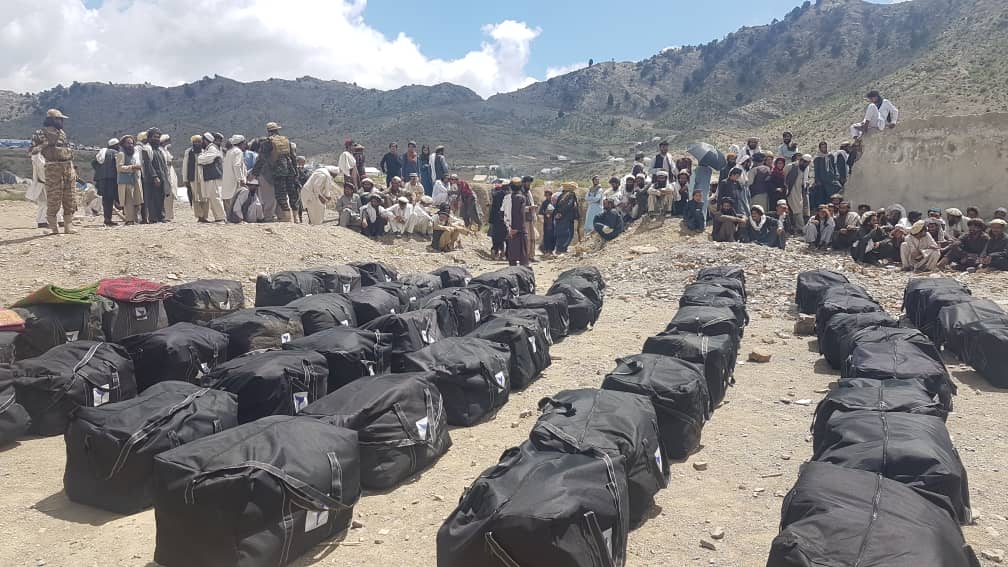
WPSO humanitarian response in the wake of the June 2022 earthquake
Despite the constantly changing and highly challenging environment in Afghanistan, WPSO and ICAN have remained in continuous communication, sharing needs and realities from the ground, and collaboratively identifying solutions. Most importantly, the relationship between ICAN and WPSO is built on trust and equal partnership that has flourished over the years.
“The most important is that trust – that you can trust your partner organization and give them the agency to go and do the project and support its members when in a difficult situation.” – Founder, WPSO
Looking Forward: Listen and Heed the Voices of Afghan Women
Despite limited resources and monumental hurdles, WPSO is proof of the value and impact that local women-led Afghan civil society organizations continue to have. Their understanding of the contexts, and constraints, combined with the unique access, knowledge, and trust that they have, makes them essential, as life savers, in this current time of heightened crisis.
Civil society voices, particularly those of Afghan women, need to be listened to and heeded. They must be engaged in the planning of humanitarian response and efforts to rebuild Afghan society. Their survival and sustainability is key to the wellbeing of Afghanistan in the long-term.
“The people inside [Afghanistan] – women who have chosen to stay or have no other option but to stay – they should be the ones who have a voice, and they should be the ones who speak up for what they need.” – Founder, WPSO
This project is supported by UK aid.
Written by Lauren Mellows

